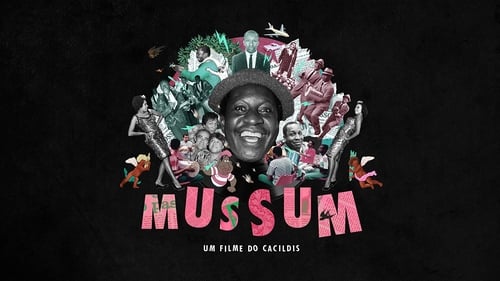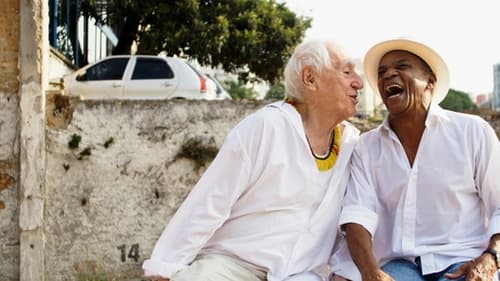Joel Zito Araújo
Рождение : 1954-11-10, Nanuque, Minas Gerais, Brasil

Producer
Роке и Пудим, композиторы старой школы Вай-Вай, делят однокомнатную квартиру, десятилетия дружбы, любовь к своей школе самбы и сомнение в прошлом: что случилось с танцовщицей Ритой, их страстью. Появление Ритиньи, дочери танцовщицы, грозит положить конец этой дружбе.

Writer
Роке и Пудим, композиторы старой школы Вай-Вай, делят однокомнатную квартиру, десятилетия дружбы, любовь к своей школе самбы и сомнение в прошлом: что случилось с танцовщицей Ритой, их страстью. Появление Ритиньи, дочери танцовщицы, грозит положить конец этой дружбе.

Director
Роке и Пудим, композиторы старой школы Вай-Вай, делят однокомнатную квартиру, десятилетия дружбы, любовь к своей школе самбы и сомнение в прошлом: что случилось с танцовщицей Ритой, их страстью. Появление Ритиньи, дочери танцовщицы, грозит положить конец этой дружбе.

Producer
Short film by Joel Zito Araújo, for the "Programa Convida", from IMS, dedicated to creation during quarantine.

Screenplay
Short film by Joel Zito Araújo, for the "Programa Convida", from IMS, dedicated to creation during quarantine.

Director
Short film by Joel Zito Araújo, for the "Programa Convida", from IMS, dedicated to creation during quarantine.

himself
Short film by Joel Zito Araújo, for the "Programa Convida", from IMS, dedicated to creation during quarantine.

Ele mesmo
The trajectory of musician and comedian Mussum as vocalist of the group "Os Originais do Samba" and later in cinema and TV as a member of "Os Trapalhões", a group that revolutionized the way of making humor on Brazilian television.

Director
Most often portrayed as an eccentric African pop idol of the ghetto, Fela is rarely presented as the strong political leader he was. Through the eyes his close friend and official biographer, the African-Cuban intellectual Carlos Moore, this documentary is devoted to unravel the complexity of Fela’s life. As the story unfolds, it reveals the glories and tragedies that shaped the lives of the pan-African generation as well as Fela's.

Self
This documentary investigates the aesthetic, political and existential trajectory of emblematic Black Brazilian actor Antônio Pitanga. He career spans over five decades, and he has worked with iconic Brazilian filmmakers Glauber Rocha, Cacá Diegues and Walter Lima Jr. He was a prominent figurehead and outspoken activist during the Brazilian dictatorship, a period of unrest in Brazilian cinema. Pitanga deep dives into the world of Antônio and the history of Brazil. The documentary was directed by his daughter Camila Pitanga, one of widely recognised faces in Brazilian television and cinema right now. The film is also a poem, and a tender ode to fatherhood.

Director
Documentary on ethnic relations in Brazil.

Screenplay
Around 900 thousand people are trafficked a year for international borders only for sexual exploitation. However, despite all the dangers, young Brazilian women to enter the world of sex tourism, believe that they will change their lives and their dream of finding a Charming Prince. A minority find a great love and get married. The film goes from the Brazilian Northeast to Berlin seeking to understand the sexual as well racial imaginary and power of young southern Cinderellas and northern wolves.

Director
Around 900 thousand people are trafficked a year for international borders only for sexual exploitation. However, despite all the dangers, young Brazilian women to enter the world of sex tourism, believe that they will change their lives and their dream of finding a Charming Prince. A minority find a great love and get married. The film goes from the Brazilian Northeast to Berlin seeking to understand the sexual as well racial imaginary and power of young southern Cinderellas and northern wolves.


Screenplay
"Vista Minha Pele" is an amusing parody of Brazilian reality. It serves as basic material for discussing racism and prejudice in the classroom. In this inverted story, blacks are the ruling class and whites were enslaved. Poor countries are Germany and England, while rich countries are, for example, South Africa and Mozambique. Maria is a poor white girl who studies at a private school thanks to the scholarship that she has due to the fact that her mother is a cleaning lady at this school. Most of her colleagues are hostile to her, because of her color and social status, with the exception of her friend Luana, the daughter of a diplomat who, having lived in poor countries, has a more comprehensive view of reality.

Director
"Vista Minha Pele" is an amusing parody of Brazilian reality. It serves as basic material for discussing racism and prejudice in the classroom. In this inverted story, blacks are the ruling class and whites were enslaved. Poor countries are Germany and England, while rich countries are, for example, South Africa and Mozambique. Maria is a poor white girl who studies at a private school thanks to the scholarship that she has due to the fact that her mother is a cleaning lady at this school. Most of her colleagues are hostile to her, because of her color and social status, with the exception of her friend Luana, the daughter of a diplomat who, having lived in poor countries, has a more comprehensive view of reality.

Story
É uma lírica história de redenção amorosa entre irmãs, mães e filhas, em uma pequena cidade do interior de Minas Gerais, onde os fantasmas da escravidão e do racismo acentuam os dramas de forma sutil e poderosa.

Director
É uma lírica história de redenção amorosa entre irmãs, mães e filhas, em uma pequena cidade do interior de Minas Gerais, onde os fantasmas da escravidão e do racismo acentuam os dramas de forma sutil e poderosa.

Editor
A documentary film about the taboos, stereotypes, and struggles of black actors in Brazilian television "soaps". Based on his own memories and on a sturdy body of research evidence, the director analyses race relations in Brazilian soap operas, calling attention to their likely influence on Brazilian African-Americans' identity-forming processes.

Executive Producer
A documentary film about the taboos, stereotypes, and struggles of black actors in Brazilian television "soaps". Based on his own memories and on a sturdy body of research evidence, the director analyses race relations in Brazilian soap operas, calling attention to their likely influence on Brazilian African-Americans' identity-forming processes.

Narrator
A documentary film about the taboos, stereotypes, and struggles of black actors in Brazilian television "soaps". Based on his own memories and on a sturdy body of research evidence, the director analyses race relations in Brazilian soap operas, calling attention to their likely influence on Brazilian African-Americans' identity-forming processes.

Screenplay
A documentary film about the taboos, stereotypes, and struggles of black actors in Brazilian television "soaps". Based on his own memories and on a sturdy body of research evidence, the director analyses race relations in Brazilian soap operas, calling attention to their likely influence on Brazilian African-Americans' identity-forming processes.

Director
A documentary film about the taboos, stereotypes, and struggles of black actors in Brazilian television "soaps". Based on his own memories and on a sturdy body of research evidence, the director analyses race relations in Brazilian soap operas, calling attention to their likely influence on Brazilian African-Americans' identity-forming processes.

Screenplay

Director

Screenplay
The documentary is structured as a video letter from a black man denouncing the persistence of racism in Brazilian society and media, a century after the official end of slavery. Thus, it presents the contradictions between two images of racial relations in Brazil: the image disseminated abroad, which spreads the myth of racial democracy, and the internal image, presented in textbooks and on television, in which negative stereotypes are perpetuated against the black population.

Producer
The documentary is structured as a video letter from a black man denouncing the persistence of racism in Brazilian society and media, a century after the official end of slavery. Thus, it presents the contradictions between two images of racial relations in Brazil: the image disseminated abroad, which spreads the myth of racial democracy, and the internal image, presented in textbooks and on television, in which negative stereotypes are perpetuated against the black population.

Director
The documentary is structured as a video letter from a black man denouncing the persistence of racism in Brazilian society and media, a century after the official end of slavery. Thus, it presents the contradictions between two images of racial relations in Brazil: the image disseminated abroad, which spreads the myth of racial democracy, and the internal image, presented in textbooks and on television, in which negative stereotypes are perpetuated against the black population.

Editor
Rescue of the life story of feminist activist from the 1930s, Almerinda Farias Gama, participant in the struggle for the right to vote for women in the 1934 Constitution, and activist of the Brazilian Federation for Female Progress, together with Bertha Lutz.

Screenplay
Rescue of the life story of feminist activist from the 1930s, Almerinda Farias Gama, participant in the struggle for the right to vote for women in the 1934 Constitution, and activist of the Brazilian Federation for Female Progress, together with Bertha Lutz.

Director
Rescue of the life story of feminist activist from the 1930s, Almerinda Farias Gama, participant in the struggle for the right to vote for women in the 1934 Constitution, and activist of the Brazilian Federation for Female Progress, together with Bertha Lutz.

Screenplay
Documentary about Nelson and Winnie Mandela's visit to the city of São Paulo, recording their encounter with the black community and social movements active in the city. The film shows the official reception and the importance of their presence in the process of recognizing the role of Afro-Brazilians in the formation of the country.

Director
Documentary about Nelson and Winnie Mandela's visit to the city of São Paulo, recording their encounter with the black community and social movements active in the city. The film shows the official reception and the importance of their presence in the process of recognizing the role of Afro-Brazilians in the formation of the country.




























